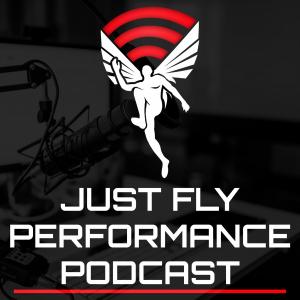Just Fly Performance Podcast

480: Phil Nash on The Infinite Game of Athletic Performance
Today’s guest is Phil Nash. Phil is a Manager of Coach Education at EXOS. He is a seasoned strength and conditioning professional who leads EXOS’s efforts to develop and educate coaches worldwide. Phil specializes in bringing practical, science-based training methods—like plyometrics and medicine-ball work—into performance systems, and regularly shares his expertise at major industry conferences On today’s show, we dig into training models ranging from the force–velocity curve to the idea of infinite games, exploring how these frameworks influence the way we view athletic performance. Phil offers his perspective on blending structured training with the freedom of play, highlighting adaptability and growth as central themes in coaching. This episode provides clear, practical insights for coaches and athletes alike on building both physical capacity and mental resilience. Today’s episode is brought to you by Hammer Strength and the Vert Trainer Use code “justfly10” for 10% off the Vert Trainer Use code “justfly20” for 20% off of LILA Exogen Wearable resistance gear at www.lilateam.com View more podcast episodes at the podcast homepage. (https://www.just-fly-sports.com/podcast-home/) Timestamps 5:12 – Phil’s Journey into Coaching and Performance Training 12:40 – Exploring the Interplay of Science and Coaching Art 22:18 – Building Strong Athlete-Coach Relationships 32:07 – The Role of Autonomy and Curiosity in Development 43:51 – Balancing Physical Preparation with Mental Readiness 55:46 – Using Constraints to Guide Skill and Movement 1:07:12 – Learning from Mistakes and Coaching Growth 1:18:09 – Phil’s Reflections on Longevity and Evolving as a Coach Actionable Takeaways 5:12 – Phil’s Journey into Coaching and Performance Training Key Idea: Phil’s path into performance was shaped by curiosity and the pursuit of practical knowledge over titles. Takeaways: Curiosity often leads to better learning than rigid career plans. Don’t chase credentials alone; focus on applying knowledge effectively. Reflect on your own journey: what experiences shaped your coaching approach? 12:40 – Exploring the Interplay of Science and Coaching Art Key Idea: Phil emphasizes blending research with intuition. Coaching is both science and art. Takeaways: Use research as a guide, not a rulebook. Stay flexible: coaching requires adapting principles to individuals. Trust experience and feel when the data isn’t enough. 22:18 – Building Strong Athlete-Coach Relationships Key Idea: Relationships drive results; athletes respond best when trust and mutual respect are present. Takeaways: Prioritize connection before correction. Listen actively; athletes often know more about their body than you realize. Strong relationships create resilience during setbacks. 32:07 – The Role of Autonomy and Curiosity in Development Key Idea: Giving athletes autonomy fosters curiosity, ownership, and growth. Takeaways: Encourage athletes to explore solutions, not just follow orders. Create environments where curiosity is rewarded. Autonomy builds long-term motivation and adaptability. 43:51 – Balancing Physical Preparation with Mental Readiness Key Idea: True performance is as much mental as it is physical. Mindset shapes outcomes. Takeaways: Prepare the mind alongside the body. Use reflection and visualization tools to build confidence. Don’t overlook recovery as a mental reset, not just a physical one. 55:46 – Using Constraints to Guide Skill and Movement Key Idea: Constraints-based training creates problem-solving and adaptable movers. Takeaways: Design environments that force athletes to adapt. Use constraints to spark creativity, not to over-control. Let athletes discover solutions instead of prescribing every detail. 1:07:12 – Learning from Mistakes and Coaching Growth Key Idea: Mistakes are inevitable; growth comes from reflection and ad...






 Visit Podcast Website
Visit Podcast Website RSS Podcast Feed
RSS Podcast Feed Subscribe
Subscribe
 Add to MyCast
Add to MyCast